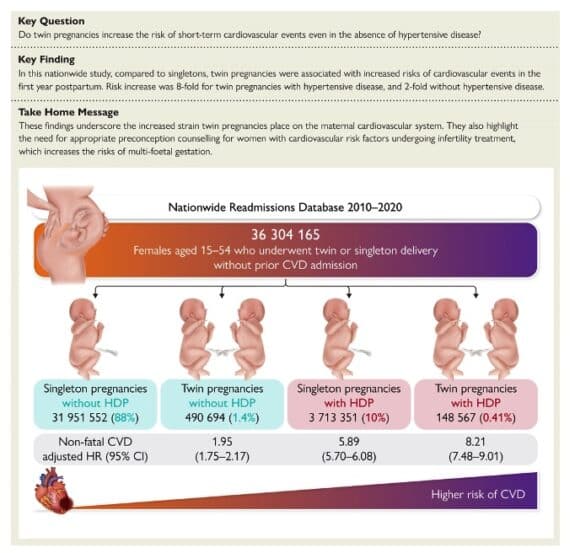For many moms-to-be, carrying twins is an exciting but physically demanding journey. However, recent research suggests that twin pregnancies may come with a hidden risk—an increased likelihood of heart disease in the weeks and months following delivery. So, do twin births pose a greater threat to maternal heart health?
Pregnancy naturally puts additional strain on a mother’s cardiovascular system, but twin pregnancies demand even more from the heart. Dr. Ruby Lin, a maternal-fetal medicine fellow at Rutgers Robert Wood Johnson Medical School, explains: “The maternal heart works harder for twin pregnancies than for singleton pregnancies, and it takes weeks for the maternal heart to return to its pre-pregnancy state.”
Using data from more than 36 million U.S. hospital deliveries between 2010 and 2020, researchers found that women who had twins were nearly twice as likely to be hospitalized for heart-related issues within a year of giving birth compared to those who had singletons. The rate of cardiovascular-related hospital readmissions was 1,105 per 100,000 deliveries for twin moms, compared to 734 per 100,000 for moms of singletons.
One of the key factors influencing heart health after delivery is hypertensive disease of pregnancy (HDP), which includes conditions such as preeclampsia and gestational hypertension. The study found that:
- Women who had twins without high blood pressure during pregnancy still had a 95% increased risk of heart complications compared to singleton moms without high blood pressure.
- Mothers of twins who also had high blood pressure during pregnancy were more than eight times as likely to require hospitalization for heart problems in the year after delivery.
- Even singleton moms with HDP faced a sixfold increase in heart-related hospitalizations.
These findings, that were posted in the European Heart Journal, indicate that while high blood pressure during pregnancy is a major risk factor, the physiological demands of carrying twins alone contribute significantly to cardiovascular complications.
The study’s results are particularly concerning given that twin pregnancies are becoming more common worldwide. Fertility treatments and older maternal age have contributed to a rise in multiple births, meaning more women may face these heightened health risks.
Dr. Cande Ananth, a senior researcher and professor at Rutgers Robert Wood Johnson Medical School, pointed out that previous studies had suggested no long-term increased risk of heart disease following a twin pregnancy. However, this latest research contradicts those findings, highlighting the need for heightened awareness and medical follow-up.
For women undergoing fertility treatments, particularly those with existing cardiovascular risk factors—such as obesity, diabetes, or high blood pressure—understanding these risks is important. Dr. Lin advises that healthcare providers should counsel patients on the potential short-term cardiovascular complications associated with twin pregnancies.
Additionally, she emphasizes the need for extended postpartum care. “Given these higher risks, healthcare providers and health insurance companies should continue to provide follow-up for up to a year after birth for high-risk pregnancies such as twin pregnancies.”
While twin pregnancies bring joy and excitement, they also come with unique health challenges. This new research underscores the importance of postpartum surveillance, particularly for heart-related complications. Expecting mothers carrying twins should discuss cardiovascular risks with their healthcare providers and plan for continued monitoring even after delivery.








